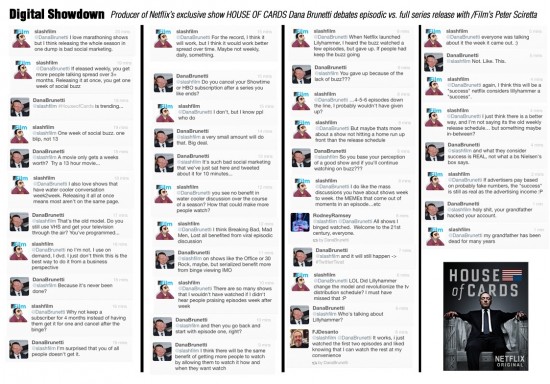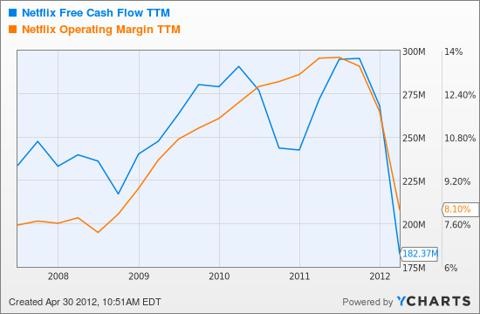Is Netflix's Full Season Release Strategy A Smart Business Model?
At the end of last week I got into a twitter debate with producer Dana Brunetti (The Social Network, 21, Fifty Shades of Grey). Dana, executive producer on the new David Fincher-produced/directed tv series House of Cards starring Kevin Spacey, began tweeting about how he didn't understand how some people didn't get Netflix's decision to release the entire season onto their streaming service all at once.
I understand it, and I get why Netflix thinks this is the way things should be. Netflix has ton of television programing available, and their users binge watch seasons in the matter of days. They have the stats to prove this. Why change whats been working for them? Why not challenge the status quo of releasing an episode a week with an original series?
I'm all about challenging the way things are done... but does it make sense?
So I responded to Dana and our back and fourth debate has now been chronicled by Mentorless and other sites. I thought it might be worth exploring further in a format that allowed me more than 140 characters.
Lets start out by establishing a few things about myself, so that you'll understand where I'm coming from:
Releasing all 13 episodes of the David Fincher-directed/produced House of Cards television series at the same time makes little sense to me from a business standpoint.
Okay, lets forget looking at this from a business perspective, and take a look at this from the point of view of a viewer:
House of Cards is not the first original series released in full by Netflix. The streaming company released all eight episodes of the first season of Lilyhammer last year. The week it was released, everyone was talking about it. (Maybe not as many people as House of Cards, but Lilyhammer didn't have David Fincher or Kevin Spacey.) I binge-watched the first few episodes with my girlfriend. I loved the concept but became disinterested in the execution. I think I may have liked the season if I had stayed with it, but for whatever reason, I just didn't.
And its also possible that if it was a weekly series and some interesting twist happened in week 4/episode 4, I may have been swayed to keep watching due to the buzz on twitter or whatnot. Not many people in my twitter or Facebook streams were talking about Lilyhammer after that first week or two.
But that may have more to do with the quality of the show than the release method. I'm sure if I had it as a series recording on my DVR I would have made it further. Maybe its that my DVR listing is almost like a todo list, a listing of programing that needs to be watched (or else it will fill up and nothing more will be recorded). It also might be that I have more time week to week than I do in one weekend. But great content will always find a way. (Look at how Arrested Development found an audience on DVD).
Lilyhammer was considered a success by Netflix, and I in no way doubt that House of Cards will be an even bigger success. The Atlantic did the math and found that breaking even won't be that hard:
With Netflix spending a reported $100 million to produce two 13-episode seasons of House of Cards, they need 520,834 people to sign up for a $7.99 subscription for two years to break even. To do that five times every year, then, the streaming TV site would have to sign up more 2.6 million subscribers than they would have. That sounds daunting, but at the moment, Netflix has 33.3 million subscribers, so this is an increase of less than 10 percent on their current customer base. Of course, looking at Netflix's past growth, that represents pretty reasonable growth for the company that saw 65 percent growth from 20 million to over 33 million world-wide streaming customers. Much of that growth, however, comes from new overseas markets. But, even in the U.S., from one year ago, Netflix saw about 13 percent streaming viewer growth jumping from 24 million to 27 million.
But Netflix's subscription revenue is not growing as fast as their content costs, and that could be a potential problem (Especially if those who subscribe for House of Cards don't stay on for the long term.
So could House of Cards be an even bigger success? Could the show get more social exposure if released episodically? Would viewer engagement improve? Or does none of that even matter in the end?
Dana and I had a brief discussion on twitter about many of these issues, compressed into 140 character thoughts. The response I got back was 50/50. Some people love the freedom of being able to watch it whenever however they want and don't care about the water cooler aspects. Others cared deeply about the shared social experience that comes from releasing episodes on a time delayed basis. I'm not sure any of us are right.
I also tweeted out this comment:
@steffieweffie81 @danabrunetti Are our future meals at all-you-can-eat buffets or nice restaurants with weekly reservations :P
— /Film (@slashfilm) February 1, 2013
And while the comment was half tongue-in-cheek, half-trolling, I do feel a desire to reprint it. Its not that I believe the comment. It goes back to Brunetti's defensive ribbing:
I think @slashfilm's account has been taken over by his grandfather today.
— Dana Brunetti 🏴☠️ (@DanaBrunetti) February 1, 2013
I do question if I'm getting older and becoming a fuddy-duddy who wants to keep things the old way and doesn't understand how the kids want to consume their media nowadays. I know that I don't idolize the old method. Deep down I know there is a better way. But I don't feel like this is it. One thing is for sure, Netflix is pushing the way media is being released, and it will be interesting to see how things change and evolve in the coming years.
Next up is the fourth season of Arrested Development...
So now I pass the discussion to you the /Film readers. What do you think?


